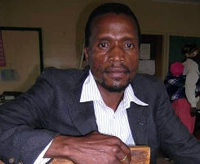A version of this story was first published at wfp.org

Vusie Maphalala takes part in a joint project run by WFP and Swaziland’s Ministry of Health.
Credit: WFP/Banele Dlamini
Dressed in his smartest suit, Vusie Maphalala waits patiently in the tiny health clinic in Mpolonjeni, located in Swaziland’s capital Mbabane, to collect his life-saving antiretroviral drugs. As a man with HIV, he knows that they are the key to survival – to living long enough to help his three small children grow up.
But he also knows that drugs alone are not enough.
Two years ago, he watched his wife die. She was on HIV treatment but was too weak and too malnourished to thrive. So Mr Maphalala comes each month not just to pick up his drugs but also his food ration which he receives under a joint project run by WFP and Swaziland’s Ministry of Health. Every month he receives more than seven kilogrammes of nutritious corn-soya blend known locally as ‘sidonono’.
Health started improving
“I was malnourished and virtually bedridden when I started getting food from WFP,” said 44-year-old Mr Maphalala, who had been battling to take the drugs on an empty stomach. “But within two months, my health and strength started improving.”
According to Martin Bloem, Chief of the HIV and Nutrition Service at WFP, “Good nutrition is essential in the treatment of HIV particularly in regions where it coincides with widespread malnutrition and tuberculosis. The current economic crisis makes it even harder for people on treatment to stay well fed."
There is no doubt, in Mr Maphalala’s mind, how important the food rations have been. “This area has often been hit by drought and sometimes there was no food, which made it very difficult to keep on taking my medication,” he said, knowing people who have been too hungry to continue their treatment. “But I don’t miss a single dose any more.”
Support to others
Now Mr Maphalala is healthy enough to do manual work and to look after his sons – as well as providing much-needed support to other HIV-positive people in his community who receive antiretroviral therapy (ART).
“As a volunteer, I help people who have recently enrolled in ART to plan their drug schedule,” he said. “I also teach them the importance of nutrition and explain that eating the corn-soya blend will help them stick to that schedule.”
Swaziland has one of the highest levels of HIV in the world. According to latest WHO/UNAIDS/UNICEF estimates, some 26 percent of the adult population is living with the virus. The 2008 Swaziland Country Progress Report states that prevalence among women is 31 percent. Young girls aged 15-24 are disproportionately affected and are nearly four times more likely to be infected than their male counterparts. The demand for treatment has been rising and in 2007 almost 60,000 people were in need of ART, 42% of whom received it.
Nutrition and food security are key components of treatment, care and support for individuals, families and communities affected by HIV, particularly in sub-Saharan Africa. Poor nutrition can hasten the onset of AIDS-related illnesses as well as making it more difficult to stick to ART. HIV also weakens the immune system and can impair food intake and absorption of nutrients. And in fact, those living with the virus need more food than those not infected. Adults with HIV have an energy requirement 10-30% higher than normal. This figure rises to 50-100% in children.
Addressing nutrition and food security is essential if the overarching international commitment to provide universal access to HIV prevention, treatment, care and support services by 2010 is to be met.
WFP implements AIDS programmes in over 50 countries addressing treatment, care and support and impact mitigation.